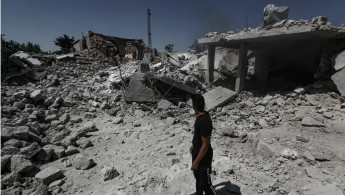Russia says it has 'fine-tuned' hundreds of new weapons in Syria
Russia denies targeting civilians with its weapons in Syria, but rights organisations have accused Moscow of targeting civilian targets including hospitals.
2 min read
Russia says it 'fine-tuned' its Kalibr missile in Syria [Anadolu]
Russia has managed to "fine-tune" around 300 types of weapon through use in the Syrian war, Defence Minister Sergei Shoigu said on Sunday.
Russia intervened in support of Syrian President Bashar al-Assad's regime in 2015 and has since been held responsible for some of the most devastating aerial bombings experienced by civilians since the onset of the conflict more than eight years ago.
Shoigu has previously said the deadly intervention has given Moscow a testing ground for new weaponry, including long-range missiles fired from ships, submarines and warplanes.
The defence minister told Moskovsky Komsomolets on Sunday around 300 weapons had been "fine-tuned" through aiding Damascus.
Among them was Russia's Kalibr cruise missile.
Previous to testing in Syria, Shoigu said, technical difficulties meant the Kalibr missile often missed targets. That is no longer the case.
While Moscow and Damascus claim their airstrikes are directed against "terrorist" targets, civilians have borne the brunt of the fighting across the country.
The most recent joint offensive has seen pro-regime forces attempt to retake rebel-held Idlib province in Syria's northwest.
Hundreds have been killed and hundreds of thousands have been displaced amid heavy bombardment and ground fighting between rebel factions and pro-Assad troops.
The United Nations announced earlier this month that it had formed a team to investigate a series of hospital bombings in Syria by Russia.
Dozens of clinics and hospitals have been damaged or destroyed in suspected Russian bombing this year, despite the medical centres being shared with the UN and then passed on to Moscow to avoid being hit.
Both Moscow and Damascus have been accused of intentionally striking civilian targets including hospitals and schools over the course of the war.
Russia intervened in support of Syrian President Bashar al-Assad's regime in 2015 and has since been held responsible for some of the most devastating aerial bombings experienced by civilians since the onset of the conflict more than eight years ago.
Shoigu has previously said the deadly intervention has given Moscow a testing ground for new weaponry, including long-range missiles fired from ships, submarines and warplanes.
The defence minister told Moskovsky Komsomolets on Sunday around 300 weapons had been "fine-tuned" through aiding Damascus.
Among them was Russia's Kalibr cruise missile.
Previous to testing in Syria, Shoigu said, technical difficulties meant the Kalibr missile often missed targets. That is no longer the case.
While Moscow and Damascus claim their airstrikes are directed against "terrorist" targets, civilians have borne the brunt of the fighting across the country.
The most recent joint offensive has seen pro-regime forces attempt to retake rebel-held Idlib province in Syria's northwest.
Hundreds have been killed and hundreds of thousands have been displaced amid heavy bombardment and ground fighting between rebel factions and pro-Assad troops.
The United Nations announced earlier this month that it had formed a team to investigate a series of hospital bombings in Syria by Russia.
Dozens of clinics and hospitals have been damaged or destroyed in suspected Russian bombing this year, despite the medical centres being shared with the UN and then passed on to Moscow to avoid being hit.
Both Moscow and Damascus have been accused of intentionally striking civilian targets including hospitals and schools over the course of the war.





 Follow the Middle East's top stories in English at The New Arab on Google News
Follow the Middle East's top stories in English at The New Arab on Google News


